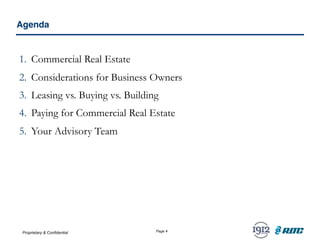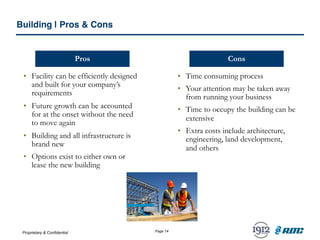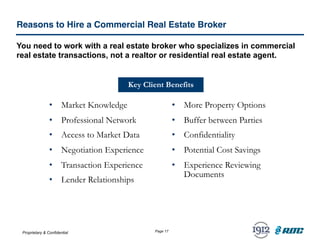Real Estate Considerations for Business Owners
- 1. Proprietary & Confidential JGSEO Lunch & Learn November 9, 2016 Maury Bronstein, Rice MBA ’97 Louis Krannich, Stanford MBA ‘09 Real Estate Considerations for Business Owners
- 2. Proprietary & Confidential Page 2 1912 Ventures • Co-founded in early-2014 with another Rice alum (John S. Wall, Jr.). • Focus on helping business owners and investors optimize their real estate portfolios. • Activities include sale-leasebacks, disposition, leasing for growth/expansion, consolidation of multiple locations, and mergers and acquisitions. • Clients include companies operating across multiple property sectors: industrial (distribution and manufacturing), retail, restaurants, office, medical, and apartments. Maury’s Background • Rice MBA, ’97. Texas A&M BBA, Management Information Systems ‘93. • Worked in management consulting first 9 years post-MBA. • Transitioned into one of the largest commercial real estate consulting firms in the US. o Ran a national commercial real estate brokerage group. o Managed a real estate fund comprised of high net worth investors. Introduction to 1912 Ventures
- 3. Proprietary & Confidential Page 3 Remote Operations Center • Company founded in 2015 • Provides third-party control room operations to pipeline operators • Recently leased office space and constructed a custom-built control room. Facility was commissioned on time and under budget. Louis’ Background • Stanford MBA ‘09. Vanderbilt BE, Engineering ’02. • Spent career in pipeline industry in engineering, operations, finance and business development. • Most recently at PG&E and prior to that, El Paso Corporation. • Relocated from San Francisco to Houston in March 2016 to help build ROC. Introduction to Remote Operations Center
- 4. Proprietary & Confidential Page 4 1. Commercial Real Estate 2. Considerations for Business Owners 3. Leasing vs. Buying vs. Building 4. Paying for Commercial Real Estate 5. Your Advisory Team Agenda
- 5. Proprietary & Confidential Page 5 What Makes Real Estate “Commercial?” Any property you use to grow, expand, or support your business qualifies as commercial real estate.
- 6. Proprietary & Confidential Page 6 Commercial vs. Residential Real Estate Buying or leasing commercial real estate takes longer and requires more research and planning than residential real estate.
- 7. Proprietary & Confidential Page 7 Types of Commercial Real Estate Today’s discussion will focus on real estate that is needed for operating your business, not investment real estate. • Real estate that generates income or is otherwise intended for investment purposes rather than being occupied by the owner or an affiliated business. • An absentee owner holds title to the property, but does not occupy it. Investment Real Estate User Real Estate • A tenant or occupier of a commercial property that is needed for operating your business. • Tenant may also hold title or own that property. • Many business owners use this as an investment strategy.
- 8. Proprietary & Confidential Page 8 Case Study: Brewery Relocation & Expansion Saint Arnold Brewing Company. (Craft Brewing, Manufacturing Facility / Retail / Restaurant, Purchase) • Oldest craft brewery in Texas. Client • Brewer outgrew its previous leased facilities and was seeking to move into a larger space it could grow into to house its operations. • Prepared a lease vs. buy analysis for the company’s owner, allowing him to make an informed decision that purchasing a building was his best option. • Represented the the company’s owner in the purchase of its current facilities. Situation • Everything is done to the beer at the brewery: brewing, filtering, kegging, bottling, selling, and drinking. • 1912 continues to stay involved with the brewer and is serving as the owner’s advisor to the redevelopment and expansion of the brewery. Results
- 9. Proprietary & Confidential Page 9 Case Study: Family Office Portfolio Company Remote Operations Center, LLC. (Energy Industry, Class A Office, Lease) • Engaged by pipeline operators to remotely monitor and control pipeline facilities.Client • This particular search was non-standard due to specific requirements for a pipeline control room. • Client needed to operate within the space 24/7 and required multiple layers of reliability redundancies. • Start-up organization that needed to move quickly to scale. • 1912 closely coordinated with Client at onset of engagement to ensure full understanding of business requirements. Situation • Within two weeks, 1912 identified seven suitable spaces and toured them with Client. • Lease with Class A building in Houston’s Energy Corridor was signed six weeks from the date the assignment began. • New, custom-built control room commissioned in September, on time and under budget. Results
- 10. Proprietary & Confidential Page 10 Case Study: Franchised Restaurant Concepts Various Franchised Concepts. (Restaurant Industry, Class A-B Retail, Lease) • 1912 has identified and negotiated spaces all over the greater Houston area while opening over 30+ stores with 15+ franchisees across these three concepts. • 1912’s clients range from new franchisees to experienced operators who control multiple locations and concepts. • In all three cases, one assignment led to a deeper relationship with the franchisor’s corporate office and 1912 being appointed as the franchisor’s “preferred” broker for the Houston market. Results • 1912 serves as the preferred real estate broker in Houston for three franchised restaurant concepts.Client
- 11. Proprietary & Confidential Page 11 Considerations for Business Owners 1. Know your own goals and limitations. 2. Build your team of advisors. 3. Ensure that your existing business structure is sound and sufficient. 4. Approach the process with not just your present needs in mind, but your future needs as well. 5. Structure the transaction with your advisors. 6. Conduct the necessary "due diligence" to avoid surprises. 7. Contingency plan for the what ifs. 8. Consider your exit strategy and post-closing goals. The following considerations are a good starting point when thinking about owning or leasing property for your business.
- 12. Proprietary & Confidential Page 12 Ownership | Pros & Cons • Property is an investment • No rent increases • Interest on mortgage is tax deductible • Annual depreciation is deductible • If market rises, you benefit if/when you sell • Extra space can be leased to others • Can occupy property as long as you like • Can modify your facility without landlord approval • You are your own landlord • More money is required up front • Credit is more important than leasing • Property values could decline • Ownership carries more legal and financial risk than leasing • Ownership can take more time and energy than leasing • Lender involvement • Obligation to repay loan Pros Cons
- 13. Proprietary & Confidential Page 13 Leasing | Pros & Cons • No down payment is required • Credit rating is not as crucial • Much easier to move (do not have to sell in the future) • Rent is a tax deductible expense • Nothing is lost if market declines • Carries less risk with more flexibility • No obligations of ownership • Repairs are often handled by property management • Rental rates fluctuate with market conditions • Offers no ownership at end of lease term • Offers no equity buildup • You may have to move at end of lease term • You have nothing to show at end of lease term Pros Cons
- 14. Proprietary & Confidential Page 14 Building | Pros & Cons • Facility can be efficiently designed and built for your company’s requirements • Future growth can be accounted for at the onset without the need to move again • Building and all infrastructure is brand new • Options exist to either own or lease the new building • Time consuming process • Your attention may be taken away from running your business • Time to occupy the building can be extensive • Extra costs include architecture, engineering, land development, and others Pros Cons
- 15. Proprietary & Confidential Page 15 Financing Options Category SBA 504 SBA 7(a) Conventional Bank Loan / Line of Credit Primarily Finances • Commercial Real Estate • Equipment • Working capital, inventory, equipment, stock, or any other business asset and debt to be refinanced • Multiple uses Amount of Financing Available • Minimum: $500,000 • Maximum: $20 million • Minimum: $250,000 • Maximum: $5 million • Varies Interest Rate • 1st Lien: Semi-fixed for first 5 years, then fixed rate is repriced (no balloon payment due) • 2nd Lien: Fixed for 20 years • Predominantly variable; some fixed- rate options • Competitive fixed or variable rates. Usually not assumable. Loan Term • Real Estate : 1st Lien of 25 years • Real Estate: 2nd Lien of20 years or less • Equipment: 10 years • Up to 25 years: Real Estate • Up to 10 years: Business acquisition, equipment • 5 to 7 years: Working capital • Frequently 5, 7, 10 or 15 years, then balloons. Down Payment • As little as 10% of total project cost (inclusive of land, construction / renovations, soft costs, and closing costs) • Typically 10-15% • 20-40% of the appraised value or purchase price, whichever is less • Closing and soft costs Amortization • 20 or 25 years • Fully amortizing • 5-25 years There are three primary sources of funding for commercial property. Terms outlined above are for illustrative purposes only
- 16. Proprietary & Confidential Page 16 Your Advisory Team 1. Real estate broker who only works on commercial real estate transactions 2. Attorney who specializes in real estate transactions, preferably commercial transactions 3. Accountant 4. Banker 5. Mortgage Broker 6. Your Business Partners 7. Your Spouse 8. Architect 9. Engineer 10. General Contractor 11. Others Several advisors will be involved in your acquisition process with the sheer number depending on your activities.
- 17. Proprietary & Confidential Page 17 Reasons to Hire a Commercial Real Estate Broker You need to work with a real estate broker who specializes in commercial real estate transactions, not a realtor or residential real estate agent. • Market Knowledge • Professional Network • Access to Market Data • Negotiation Experience • Transaction Experience • Lender Relationships • More Property Options • Buffer between Parties • Confidentiality • Potential Cost Savings • Experience Reviewing Documents Key Client Benefits
- 18. Proprietary & Confidential Page 18 Contact Information Maury Bronstein (713) 522-1912 maury.bronstein@1912v.com www.1912v.com Louis Krannich 205-478-6012 louis.krannich@pipelineroc.com www.pipelineroc.com

















